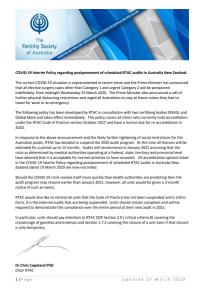43 results
Reset filters
'Doing it in the right order': childless men's intentions regarding family formation
In high-income countries, parental age at first birth has increased and this postponement increases the risk of involuntary childlessness or having fewer children than desired.
How To Help Patients Contemplating A Pregnancy During COVID Times
Practice considerations for patients thinking about pregnancy during COVID-19
IVF is changing now clinics have reopened. Here’s what to expect during the coronavirus pandemic
IVF clinics are now open after a temporary closure due to the coronavirus pandemic. But in some states clinics are not yet operating at full capacity. You will also see some changes to your care.
Having a baby in your 40s with ART: the reproductive dilemma of autologous versus donor oocytes
Women aged ≥40 years, using donor oocytes had a significantly higher CLBR than women using autologous oocytes. The findings can be used when counselling women ≥40 years about their ART treatment options and to inform public policy.
Using technology to enhance communication in ART care
Technology is increasingly used in all spheres of life, including in healthcare. In this chapter we summarize what is known about when and how technology can enhance communication in medically assisted reproduction (MAR) care and how this might improve the patient experience
FSA COVID-19 Interim Policy regarding postponement of scheduled RTAC audits in Australia New Zealand
FSA COVID-19 interim policy rearding the postponement of scheduled RTAC audits in Australia & New Zealand
Acceptability of screening for pregnancy intention in general practice: a population survey of people of reproductive age
Findings suggests that routinely asking people of reproductive age about their pregnancy intentions and advising those who are planning pregnancy about what they can do to ensure optimal preconception health would be acceptable to most people and may improve reproductive outcomes.
Applications to statutory donor registers in Victoria, Australia: information sought and expectations of contact
This paper reports on the information and contact sought by donor-linking applicants to the central and voluntary registers in the state of Victoria, Australia, which has one of the most comprehensive donor-linking legislative frameworks in the world.
American Heart Association ideal cardiovascular health score and subclinical atherosclerosis in 22–35 year-old adults conceived with and without assisted reproductive technologies
Is ART related with the association of American Heart Association (AHA) ideal cardiovascular health score and markers of subclinical atherosclerosis?
Do à la carte menus serve infertility patients? The ethics and regulation of in vitro fertility add-ons
Add-on treatments are the new black. They are provided (most frequently, sold) to patients undergoing in vitro fertilization on the premise that they will improve the chances of having a baby. However, the regulation of add-ons is consistently minimal, meaning that they are introduced into routine practice before they have been shown to improve the live birth rate.

